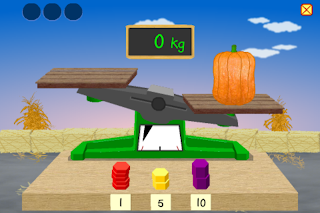Watching my children use them with ease and seeing how children flock to another child with an iPod shows what a fantastically engaging little device they are. Almost every child has access to an iPod, iPhone or iPad in their household and they know how to navigate the touch screen.
iPod positives -
- portability
- relatively cheap
- millions of available apps
- privacy and restriction settings
- most households/children have one or a compatible device
- internet accessibility - immediate download to blogs etc.
- user friendly
iPod negatives -
- social networking issues (cyber bullying)
- can be dropped
- charging needs (battery life is long enough for classroom exercises)
- cost of phasing in to schools - parents might not be supportive of supplying own devices
"Starfall Pumpkin"
Children can use iPods to video (and upload to YouTube), photograph, record audio (Audioboo), as explored in previous blogs. As the school year progressed children could be assigned more detailed tasks that required more individual thinking and input. A research project on 'insects in the school grounds' could involve children photographing and uploading photos to a class page then resourcing information online on each insect as a class.Personally I have found trying to teach early primary children in a "computer room" a fruitless exercise. There are always computers/headphones that aren't working and it is difficult to see each child and their progress behind the screens. It is difficult for the children to gain a teacher's attention. The activities seem quite clumsy when compared to touchscreen capabilities of the iPod touch.
Further examples:


No comments:
Post a Comment